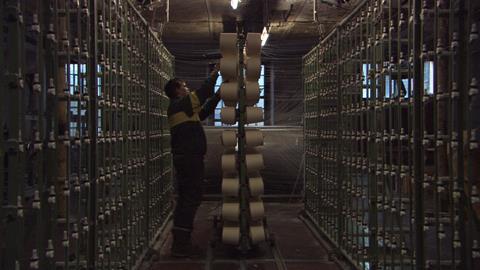Dir: Nikolaus Geyrhalter. Austria. 2015. 188mins

Europe’s economic crisis isn’t just in a faraway place like Greece. In a corner of Austria, one of Europe’s most prosperous countries, people barely make ends meet and the future looks worse, as Nikolaus Geyhalter observes in a decade-long look at the aftermath of a factory closing.
Over The Years shows us how persistent and stubborn village life can be in an era of supposed globalisation.
Over The Years couldn’t be more un-commercial – a doc of three hours, about the collapse of a textile business, with a “cast” defined by its lack of photogenic charisma. Yet Geyrhalter gets at truths that go unseen and at real people struggling with extraordinary challenges. And Over The Years will struggle to be seen. It’s likely to play at doc festivals, and in museums, and eventually at brave cable outlets willing to take on a doc this long. (Austrian television is a backer.)
Still, this is an exceptional film, not just for its marathon reporting and editing achievements, but also for its pictorial refinement. With high production values (despite a low budget), Geyrhalter brings a rare humanity to people who go unseen.
Over The Years takes us to Waldviertel, an isolated region of Austria, near the Czech border, which once had a flourishing textile industry. Those days are over for the Anderl firm, which closes its doors in the early years of Geyrhalter’s extended visit.
We see meditative shots of the company’s quarters for more than a century, nestled amid hills and meadows, operated with a traditional approach that predestines its demise. Yet Geyrhalter is interested in its people, many of whom never worked anywhere else and won’t work anywhere else again. Aging and untrained, they find that no employer (of the few out there) wants them.
But they can talk, albeit shyly at first. We don’t learn names, but we meet a quiet man, once an accountant, who shovels snow as Anderl nears the end. A fiftyish woman, also an Anderl casualty, talks of raising her two grandchildren as she and a son now raid trash bins for aluminum cans. The factory manager and his wife differentiate jokingly between personal bankruptcy and the failure of the firm. There’s no money in either place, he admits.
Geyrhalter’s subjects are resilient, yet the fall of Anderl, a tangle of anachronisms, came partly from within. We don’t see a computer anywhere in the offices, yet we do see a woman, before she loses her job - who folds cloth nappies and packages them by hand – admitting to Geyrhalter with a heavy local accent that her family uses Pampers on their children. The firm’s secretary, before she’s laid off, speaks on a phone that’s more than 30 years old and keeps records in pencil in a ledger book.
Over The Years shows us how persistent and stubborn village life can be in an era of supposed globalisation. One former worker who lives near the Czech border says he visited the Czech Republic once, and probably won’t go again, because his passport expired and he can’t afford a new one.
Over The Years films its subjects head-on (just as it confronts their grim prospects). They remind you of the large-format still portrait photography in contemporary art galleries, but also of tradespeople depicted in classic early 20th century photographs (by August Sander and others), when people were defined by the trade that they practiced for life. No commentary is need as those long portrait shots fade into silence.
Toward the end of this unsentimental film, one resilient family is back again. Their once-active children have gained weight and are silent. And they’re invisible, we’re told, because the family that once gathered aluminum cans now forages in the forests for mushrooms and anything else. “We disappear,” the father admits candidly. This long graceful film allows them a brief dignified reappearance.
Production company: Nikolaus Geyrhalter Filmproduktion, Austrian Film Institute, ORF Austrian Television, Lower Austria Kultur
International sales: Autlook Filmsales GmbH welcome@autlookfilms.com
Producers: Nikolaus Geyrhalter, Michael Kitzberger, Wolfgang Widerhofer,
Markus Glaser
Screenplay: Nikolaus Geyrhalter, Wolfgang Widerhofer
Cinematography: Nikolaus Geyrhalter
Editor: Wolfgang Widerhofer







![The Brightest SunScreen[Courtesy HKIFF]](https://d1nslcd7m2225b.cloudfront.net/Pictures/274x183/3/5/0/1448350_thebrightestsunscreencourtesyhkiff_312678.jpg)













